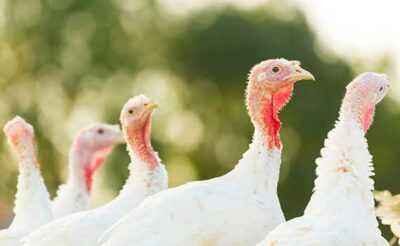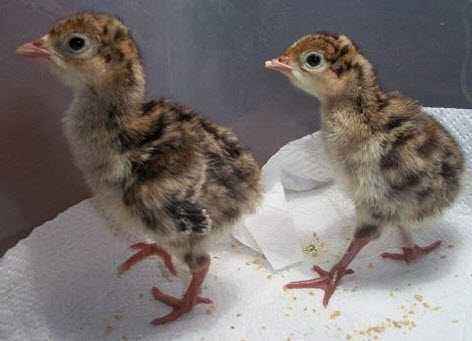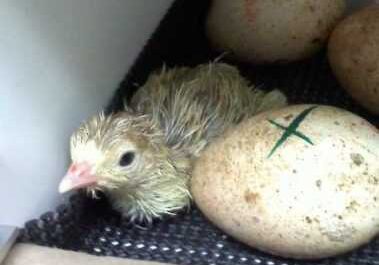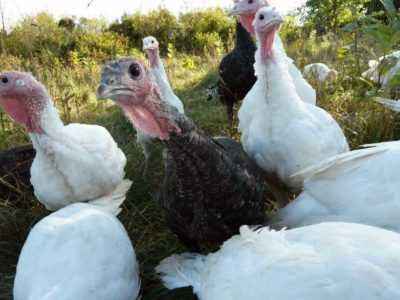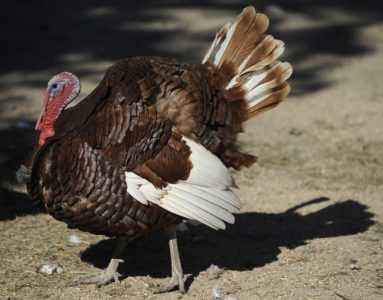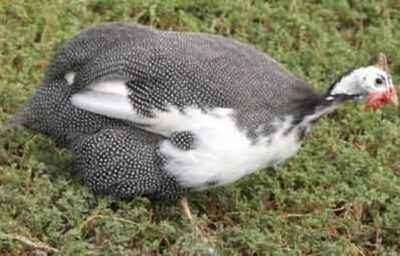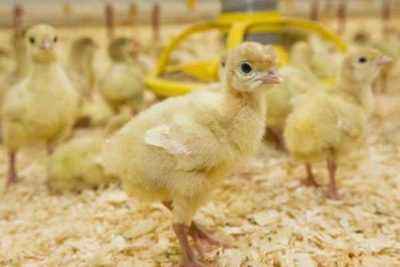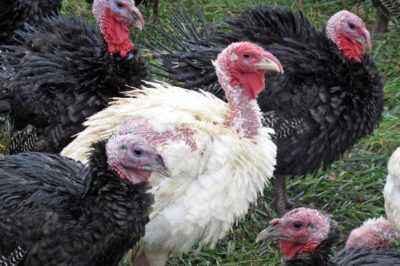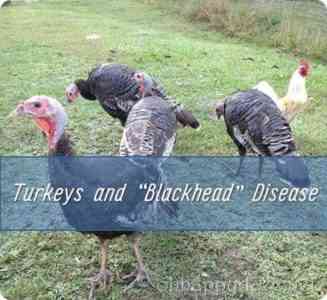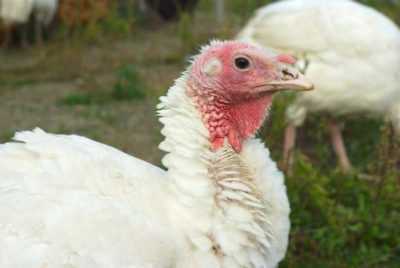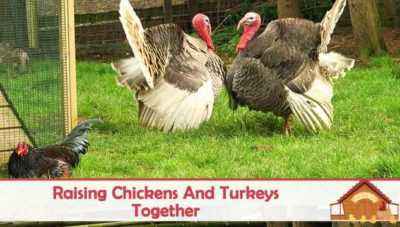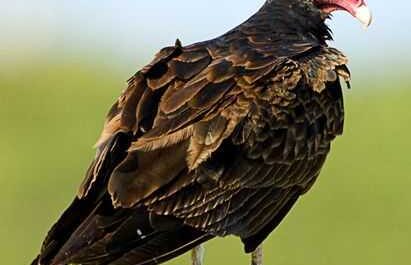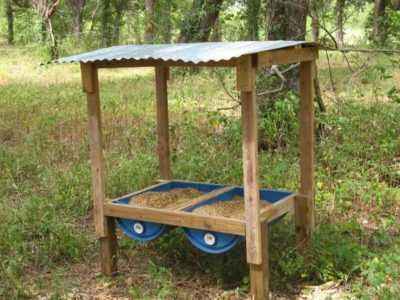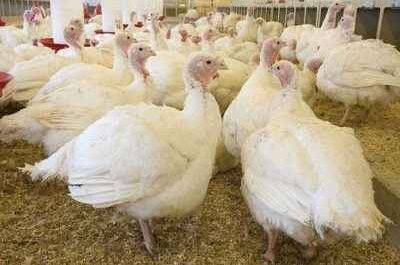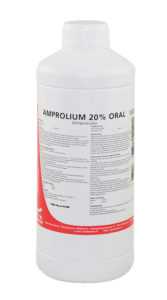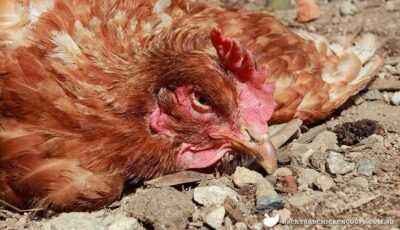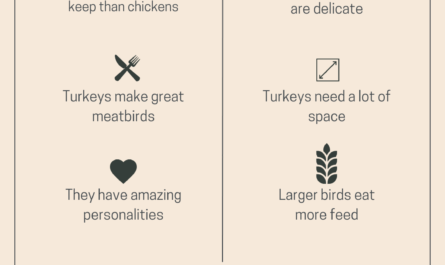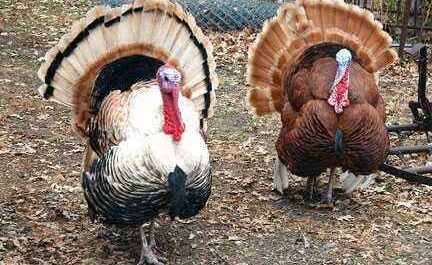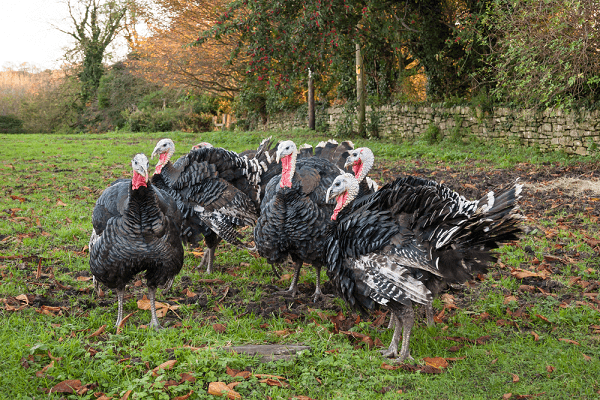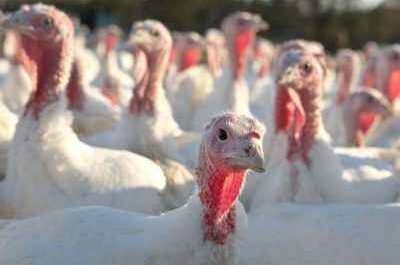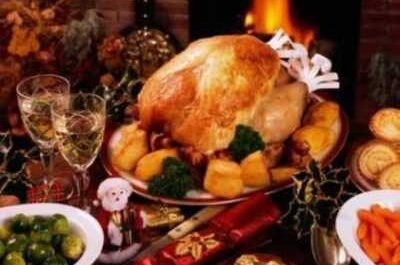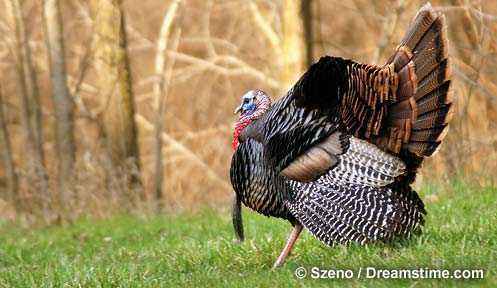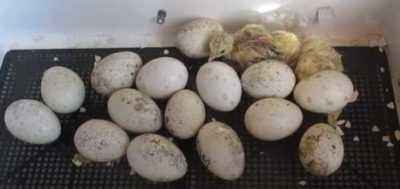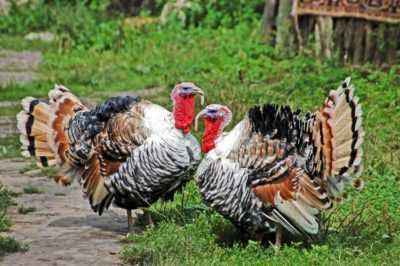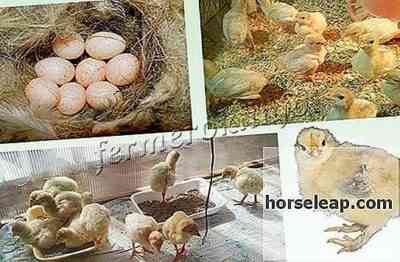How to feed turkeys so that they recover well and gain weight? This question often worries novice farmers. Basically, a turkey is an omnivorous bird. The main feed for her is not much different from the food of other poultry. The only condition is that the menu should contain more protein. Turkeys are more sensitive to stale and poor quality foods.In order for the bird to recover quickly, the diet should be considered correctly.
- Main nutrition components
- Foods for adult turkeys
- Grain feed
- Cake and meal
- Greens and root vegetables
- Animal feeds and mineral and vitamin supplements
- Feeding rates for turkeys
- Uterine herd
- Feeding turkeys
- Feeding turkeys
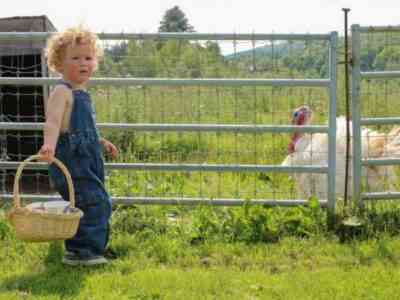
Feeding turkeys and small turkey poults
Main food components
Before you talk than you can feed turkeys at home, you need to understand the main components of the diet. A complete diet should include all the main components that ensure normal metabolism, immune defense and rapid population growth. Only then can you get a better yield, at a minimum cost of feed.
So, a balanced diet of adult turkeys and turkey poults of different ages should include:
- Proteins. In the diet of turkeys, the amount of protein is about 28-30%.About 70% of the proteins they get from different grades of grain, 30% is of animal origin. Proteins and amino acids are important components of all body cells, they are part of most enzymes.
- Fats. They are the main depot of energy, are deposited under the skin, between the fibers of the muscles, in the peritoneum. If necessary, turn into carbohydrates. Also, lipids improve the absorption of fat-soluble vitamins. In the diet of turkeys should be 3.5-4.3%. If birds are fattened before slaughter, the amount of fat is increased to 5-6%. When the lipid content in food exceeds 7%, the growth of turkeys slows down. The main sources of fats are grain, oilseed meal, nuts.
- Carbohydrates (sugar, starch, fiber). These substances are a source of energy for poultry. Their content on the menu is 60-65% (including fiber). The main sources of carbohydrates are cereal feed, fresh herbs, wet mixes with potatoes, beets, carrots. It is very important that enough fiber, about 3.5-9%, is included in the carbohydrate feed. It has a positive effect on digestion and becomes a medium for the reproduction of beneficial bacteria in the intestines.
- Minerals. Various minerals take part in the construction of the skeleton of a bird, are part of enzymes, maintain the osmotic pressure in body fluids. It is important that the diet includes adequate amounts of calcium, phosphorus, manganese, sodium and potassium. Also, turkeys need iron, selenium, iodine, magnesium, zinc, etc.Most minerals are found in meat and bone meal, some green plants and vegetables, shells, and chalk.
- Vitamins. These are very important substances that are involved in all metabolic processes. Turkey gets them from fresh herbs, vegetables, sprouted grains, fish oil. Vitamin D, as well as fat-soluble vitamins A and E are especially important for growing turkey poults. Turkey group B, vitamin C, PP, etc. are needed.
There is no complete set of nutrients product. Therefore, feeding turkeys at home, both adults and young adults, should be varied. This is the only way to ensure the supply of all necessary components for normal growth. And proper care in the first and subsequent days will allow you to grow birds without loss.
Foods for adult turkeys
At home, it is really possible to fully ensure full nutrition of turkeys. All the necessary food is at hand. In the first days the birds menu includes the following groups of products:
- Grain and grain mixtures
- Oilcake from oil plants
- Green feed
- Juicy foods
- Products of animal origin
- Mineral supplements
- Vitamins
- Gravel, pebbles, sand (without them food is poorly digested)
Cereals
Cereals form the basis of nutrition. It is best to feed with wheat and barley.With pleasure, the turkey eats corn, slightly worse oats. Grain is produced both whole and processed at a grain mill (tart). The crushed grain is well digested. It is often mixed with green grass or yeast (add beer or food yeast). It is good to include bran in the diet. Also, birds need to be given peas, it has a lot of protein. Although proteins from legumes are absorbed worse than from grains.
Cake and meal
Oilcake from oil plants (sunflower, soybean, flax) is a product in which very high fat content. There is also a lot of protein in such waste. It is cheap cake, it can be obtained at any plant that produces vegetable oil. From time to time, birds of different ages are given regular sunflower oil and even melted lard.
Greens and root crops
In summer turkeys are necessarily given grass and plant tops. They are high in vitamins and fiber. Nettle, plantain, timothy, clover, alfalfa, lupine, tops of carrots and beets, green pea pods are best suited for feeding. Before giving turkeys grass, it is carefully ground. In winter, when there is no fresh green food, hay, straw, grass meal, and needles are included in the poultry diet. Good silage feeding.It can be made according to this recipe:
- Corncobs of milk ripeness – 40%
- Carrots with tops – 40%
- Clover, alfalfa, garden weeds – 20%
All ingredients are crushed and thoroughly mixed. Then loaded into a silo pit. After 6-8 weeks, silage can be mixed into feed and wet mixers. Of the wet foods, turkeys are best suited for carrots, boiled potatoes, you can feed the birds pumpkin, cabbage, beets, but not red. Also give kitchen cleanings, leftover food from the table without spices. If you feed feathered kitchen waste, keep an eye on their freshness. After all, we ourselves do not eat spoiled foods.
Animal feed and mineral and vitamin supplements
Of animal products, meat, meat and bone and fish flour are best suited. In the summer, in free pasture, the turkey is independently looking for bugs, worms, midges. She can perfectly fight garden pests. To improve digestion, a bowl of gravel or crushed shells is always placed next to the feeder. As mineral additives give chalk, salt. To replenish vitamins, you can add premix, purine, etc. to the nutrition of home turkeys. on industrial farms, birds are often given hormones. But at home, this should not be done so as not to destroy the livestock.
Feeding rates for turkeys
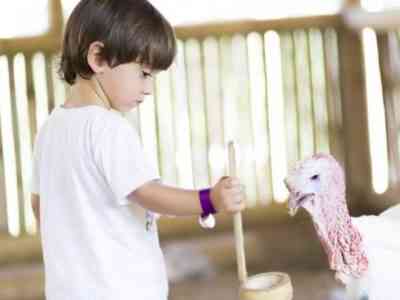
Follow the rules of feeding
So, we figured out the better to feed adult turkeys. But to ensure their health and growth, it is necessary to observe the correct proportions and frequency of feeding. After all, the content of useful ingredients in all products is different. The diet for birds is of several types. When growing the maternal herd, they make sure that turkeys with turkeys do not gain excess weight, they get enough proteins, calcium and vitamins. If fattening is carried out before slaughter , the caloric value of food is increased due to fats and carbohydrates.
Uterine herd
The standard feeding of turkeys and the daily norm are as follows:
- Grain – 100-120 g
- Wheat bran – 30 g
- Cake – 20 g
- Meat or fish meal – 4 g in winter, 1-16 g in spring and summer
- Herbal flour – 30-50 g in winter and spring
- Fresh greens – 240 g in summer
- Sugar beet – 120 -150 g in winter and spring
- Carrot (root) – 50-60 g in winter and spring
- Shell or chopped chalk – 3-7 g
- Kostna I flour – 2-2.5 g
- Kitchen salt – 1-1.2 g
In spring, the diet of breeding herds of mature age is enriched with sprouted grain (about 50% of total amount), cereals, oilcake, carrots, beets and a mash of other root crops.Be sure to give vitamins and mineral supplements, animal proteins, hay from clover or alfalfa, yeast. When green grass appears in the yard, birds are kept from morning to late in the pen or on the lawn so that they can graze. Turkey food is only fresh. Wet mixers should be removed 20 minutes after serving so that they do not deteriorate.
Feeding turkeys
Fattening turkeys for fast weight gain should be done before slaughter . Their diet should contain more protein and fat. Here is an approximate norm and daily feeding schedule:
- Chopped grain or tart – 250-350 g
- Bran from wheat – 40-50 g
- Whole grain – 70-80 g
- Carrots, pumpkin, fodder and sugar beets – 50-60 g
- Boiled potatoes – 100-120 g
- Cake – 30-40 g
- Fish and meat waste or flour – 100 g
- Meat and bone meal – 10-15 g
- Salt – 2-3 g
- Crushed seashells or chalk – 10 g
The amount of food is increased when the weight gain table shows higher numbers. Forced turkey feeding was practiced. The birds were closed in tight cages and 10-12 balls of flour, fat and vegetable fat were thrust into the throat by force. The tight content and high calorie content of the food led to an increase in body weight.Breeds that are gaining weight without such methods of feeding are now bred, if the maintenance and care of them is correct.
Feeding turkeys
Feeding turkeys is a very responsible business. In the first weeks, chicks require special care, they are sensitive to cold and damp, poor-quality or stale food. To keep the young growth paid off and there is no case, the following rules should be followed when feeding:
- Food is given on a soft litter (paper, cardboard) so that the chicks do not damage the beaks
- Water for drinking should be warm in the first days, about 25-30 degrees
- Make water better with sugar, vitamins, you can give an antibiotic to prevent intestinal diseases
- The first time newborn day old chickens need to be fed no later than 12 hours after hatching
- The time between meals in the first week should be e more than 3 hours, after 7-10 days, the number of feedings is reduced, two-week-old turkey poults are fed 4 times a day
- All food for small turkey poults must be fresh, the leftovers cannot be left, they are removed after 20-30 minutes after feeding, if turkeys do not eat everything
- New food is introduced gradually, one product at a time, they need to be mixed with usual types of food
- When feathers break out of the chicks, they continue to grow in a common house .
The daily poultry is fed with a mash of boiled testicle and crumbly thick porridge.From the third day, add chopped grass and green onions. At the end of the week, young animals can be fed steamed cereals, barley, bread. Be sure to add kefir, sour milk, cottage cheese to the menu. The testicles are completely removed from the second week. At this age, you can feed the chicks with such a hand-made mash:
- Wheat groats – 35%
- Corn groats – 35%
- Boiled eggs – 10%
- Cottage cheese – 10%
- Bran from wheat – 8%
- Shells crushed – 2%
Often, chicks are fed with special feed start. This is how turkey poultry feeds in large numbers. When feeding with compound feeds, it is easier to care for them. To find out how much feed young animals of different ages need, what is its approximate consumption, the table will help.
It is very important to feed small poults of any age at the same time of day. When they get used to the regime, digestive enzymes are intensively produced at the right time.Food is better absorbed, and small turkey poults grow quickly and gain weight. After all, we also eat at about the same time. To correctly understand all the nuances of feeding, you can see how the turkeys are fed on the video.


